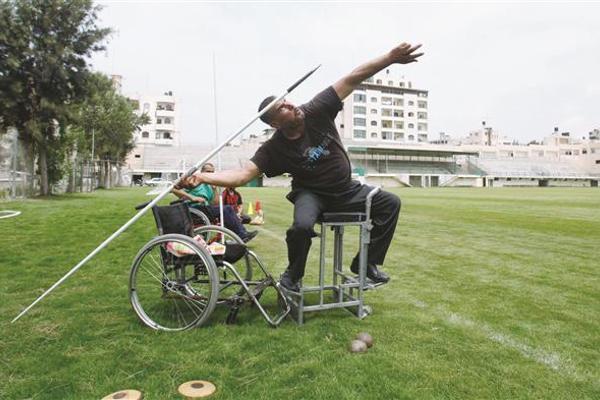Gazan Paralympian vows to bring home gold medal
GAZA CITY - Agence France-Presse


Palestinian Paralympic athlete Khamis Zaqout throws the javelin during a training session at Palestine Stadium in Gaza City. REUTERS photo
After winning medals in Arab and international competitions, Gaza Paralympian athlete Khamis Zaqout is hoping to set a new world record when he competes in the London Games.Zaqout, a 47-year-old father of nine who comes from Khan Yunis refugee camp in southern Gaza, will participate in three disciplines -- shot, discus and javelin -- after qualifying earlier this year.
A construction worker by trade, Zaqout had a bad accident while working in Israel in 1992 which left him partially paralyzed and confined to a wheelchair.
In his late 20s at the time, he was sent to the West Bank for treatment at the Khalil Abu Raya Rehabilitation Center in the West Bank city of Ramallah where he spent several years learning how to live with his disability. It was there that he began playing basketball and swimming.
“I started in 1992 at the Abu Raya Rehabilitation Centre where we later started doing sports for the physically disabled in Palestine,” says Zaqout, who quickly excelled at wheelchair basketball.
“I was exceptional among the athletes and then I was made team captain,” he says. Two years later, Zaqout took part in the Paralympic qualifiers in Iran where his team came sixth in wheelchair basketball.
The next year, Zaqout changed track after talks with his coaches, switching to the disciplines of shot, discus and javelin.
Following nearly two decades of training, during which the stocky Gazan took part in multiple international sporting events, Zaqout finally achieved his long-awaited dream in March during the Paralympic qualifiers in Dubai.
“I set a new (shot) world record of 11.4 meters,” he says of the competition, which saw him return home with five gold medals in shot, discus and javelin.
With the London tournament set to begin in just days, Zaqout is now eyeing the ultimate trophy -- a Paralympic gold. Palestinian athletes have never won any medals in the Olympic Games but have managed to win three medals in the Paralympics -- a bronze for shot from Sydney in 2000, and two more from the 2004 Athens Games: a silver for shot and bronze for long jump.
This year, Zaqout, who competes in class 55/56 for wheelchair athletes who throw from a seated position, is one of just two Palestinians taking part in the 2012 Paralympics which begin on August 29.
His co-competitor is Mohammed Fannouna, a 32-year-old partially-sighted long jumper, who took home a bronze from Athens for a jump measuring 6.59 metres. Fannouna, who competes in class 13 for athletes with a visual impairment, is also to participate in the 100 and 200 meters, as well the javelin.
Zaqout says Palestinian athletes face huge obstacles when training to compete at such a high international level, since they suffer from a lack of equipment and woefully inadequate facilities.
Although athletes and sportsmen across the occupied territories are affected by the financial crisis facing the Ramallah-based Palestinian Authority as well as Gaza’s Hamas rulers, the situation is much tougher for those living in Gaza, which has been subjected to an Israeli blockade since 2006.
“We don’t have the basic rights of any athlete,” says Zaqout, who was barred by Israel from leaving Gaza in early June to attend a pre-Olympics celebration organised by the British Consulate in Jerusalem and Ramallah. “We don’t have proper sports equipment, or training grounds -- or even wheelchairs,” he explained. “Each player should have at least 10 javelins but we have six people training with only four. And our team only has five discuses instead of a minimum of 20.”
In the run-up to the Games, Team Palestine spent 10 days training in Qatar before flying to London on Aug. 23.
“I know it’s not enough,” shrugs Zaqout. “You need to train for at least two months before competing.” The two Gazans also struggled with the addition burden of training during the Muslim holy month of Ramadan, when the faithful fast from dawn till dusk. Ramadan ended on August 19.
“This,” he says “shows the will and the determination of the Palestinian people.”
For this one-time steelworker, participating in the competition is a way to change the way society views those with disabilities.
“We want to achieve something, to prove to the rest of the world that disabled Palestinians don’t rely on others, and maybe change the way society looks at us,” Zaqout admits. “Palestinians are capable of anything, in spite of the hardships of occupation and the blockade, which is something we have proven through our participation in the Paralympic Games.”
